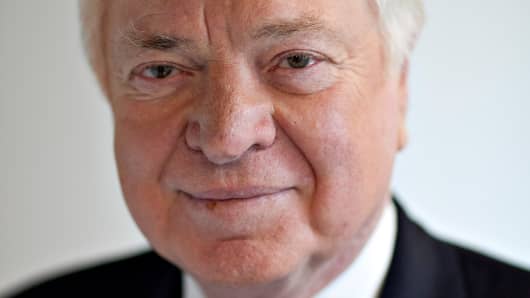Last year, UHS reported a 3 percent increase in net revenue, up to $6.96 billion, compared with $6.76 billion in 2011. Adjusted net income in 2012 was $406.4 million, versus $391.7 million in 2011.
The acquisitions of Psych Solutions and Ascend Health also left UHS in a prime position to benefit from Obamacare, Miller said.
Generally speaking, Miller said, he is deeply skeptical that the Affordable Care Act—particularly its transition to state and federally based health-care insurance exchanges to ensure coverage for all Americans—will take effect under fast-approaching deadlines set by the new law.
(Read More: Two-Thirds of Americans Don't Know If They Will Insure Under Obamacare)
"This Obamacare, let me quote [Senate Finance Committee Chairman] Max Baucus, 'It's a train wreck,' " Miller said. "It's a mess. And it's supposed to get organized starting in October, and effective in January, and now you've got the IRS as that one that's supposed to do the administering for you? Good luck buddy, good luck. So, that's not going to happen, it's not going to happen."
"I like where it's going," he said. "I don't think it's going to get there as swiftly as we think."
But when asked if his own company faces a significant potential upside from Obamacare in the near term, Miller didn't hesitate in answering: "Absolutely."
"The expansion of Medicaid is a good thing," he said. "The impact on bad debt, I mean, that's a terrific thing."
Miller said that on average, uncollectible bills at UHS psych services facilities run at about 12 percent to 20 percent of total billings. That number can be even higher in some areas, including large cities.
"This is bad debt, this is people that come into the hospital, must get treated, and don't pay," he said.
With the new law, and its mandated coverage of people's mental health needs, the bad debt of UHS's business could drop precipitously.
"We don't have to do anything," Miller noted. "All of a sudden people start paying, who've never paid before. ... Bang! All of a sudden they pay a bill."
(Read More: Ready or Not: States and Insurers Brace for Obamacare)
Not all of the government's moves are helpful to UHS, including the ongoing budget cuts known as sequestration.
"Sequestration is really affecting businesses, different industries, and where they cut back, you have less people likely to be covered [by health insurance] and coming in," Miller said. "And our business, the overall business, is seeing less people hospitalized."
"That's been happening now for a couple of years. That's just the effect of the economy," he said. "Sequestration obviously doesn't help it."
But that's just a small smudge on Miller's generally bullish outlook for his company—and the industry overall.
"The nice thing about this business, and why I've stayed with it so long, and all: We don't have technological obsolescence," Miller said. "People get sick, you can't stop it. And we're getting older as a population. It's an inexorable business, if you do it well."
(Read More: Required Flu Shots No Sting for Hospital Workers)
—By CNBC's Dan Mangan. Follow him on Twitter @danpostman.



